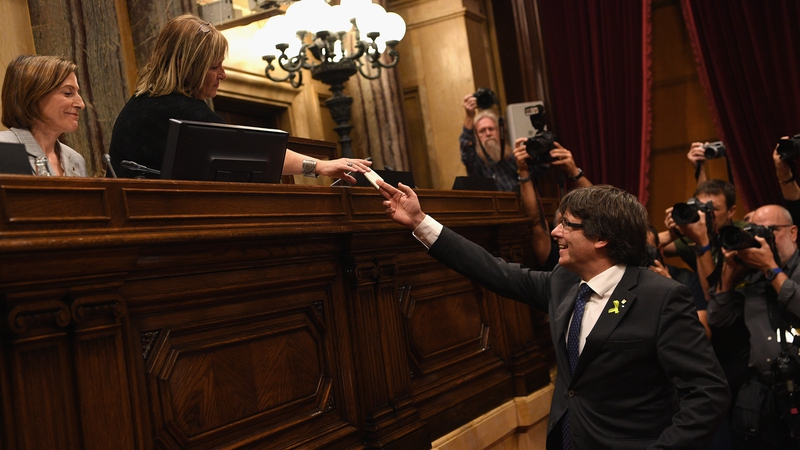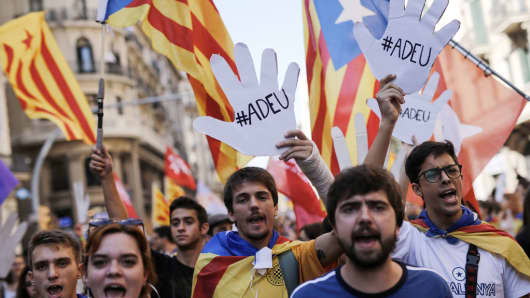Catalonia declares independence from Spain
- The regional parliament of Catalonia has voted Friday to declare independence
- Meanwhile, the Spanish Senate in Madrid is also voting Friday on whether to implement Article 155 of the constitution – meaning that central government could be set to remove the regional government
- Prime Minister Rajoy says the rule of law will be restored.
The regional parliament of Catalonia has declared independence from Spain, just hours before Madrid was due to officially impose direct role on the region.
The independence motion passed in the Catalan assembly with 70 votes in favor, 10 against and 2 blank ballots, according to Reuters. The parliament is typically 135-strong but politicians from the Socialist Party, the People's Party (PP) and the Ciudadanos party abstained in protest.
Spain's IBEX was down 2 percent shortly after the news at 2:30 p.m. London time with Spanish banks leading the losses. The euro dipped below the $1.16 handle and was about half a percent lower for the session.
In response the Spanish Prime Minister Mariano Rajoy took to Twitter to call for calm: "I ask for calm from all Spaniards. The rule of law will restore legality in Catalonia," he said.
Tweet
Antonio Barroso, Deputy Director of Research at Teneo Intelligence said in a snap note Friday that the Rajoy administration will now move quickly to dismiss the Catalan separatist leader Carles Puidgement from his post as president of the Government of Catalonia.
Barroso said he expected this to increase tension and fresh clashes between police and pro-independence demonstrators were likely.
The Spanish Senate in Madrid will now vote Friday on whether to implement Article 155 of the constitution – meaning that central government could be set to remove the regional government, install a technocratic government and call new regional elections.
On Saturday, the official publication of the decision will effectively trigger the direct rule, but it's unclear how this could immediately manifest itself. Theoretically, this will give the regional government more time to potentially revisit its position, according to Barclays.

Catalan President Carles Puigdemont casts his vote for independence from Spain
"It would be so illegal (to declare independence); they (Catalan lawmakers) even risk jail," a European official from Catalonia, who is close to the discussions but didn't want to be named due to the sensitivity of the issue, told CNBC via phone on Friday morning.
Speaking at the Senate, Prime Minister Mariano Rajoy said Friday morning: "In Catalonia there have been attempts to ignore the laws, abrogate them, to not follow them."
"What occurred on the 6 and 7 of September in the Catalan Parliament was the biggest joke to democracy, when two illegal laws were passed and a referendum was called," he added.
The Senate is likely to vote through the conditions put forward by Rajoy, however, it is unclear how Madrid's decision to replace the Catalonian government would play out.
The regional parliament of Catalonia has declared independence from Spain, just hours before Madrid was due to officially impose direct role on the region.
"It is not guaranteed that the central government will be able to immediately exercise full control of regional executive powers. Catalonia has a very high degree of self-government, comparable with some of the most decentralized regions in Europe and elsewhere," Barclays said in a note.
Catalonia has full responsibility for civil law, police, education, health care, industry, trade and consumer affairs, environment, research, local government, tourism, transport, media and several other areas.

Students hold placards reading 'good bye' as they protest during a demonstration in Barcelona on October 26, 2017.
Catalonia's regional parliament has declared independence from Spain on in a disputed vote that is now likely to be declared illegal by Spain's constitutional court.
The independence motion was passed in the 135-strong assembly with 70 votes in favour, 10 against and two blank ballots, the assembly's speaker said.
Lawmakers from the Socialist Party, the People's Party and Ciudadanos had left the chamber before the vote in protest.
Spain's Prime Minister Mariano Rajoy has called for calm in a tweet posted minutes after the independence vote.
He wrote: "I ask for calm from all Spaniards. The rule of law will restore legality in Catalonia."
Meanwhile, the European Commission has said that it has no fresh comment on Catalonia following the ballot.
"We have nothing to add to what we said at (the regular) midday (briefing for journalists," Commission spokeswoman Mina Andreeva said.
At the briefing, she referred reporters to earlier comments by Commission President Jean-Claude Juncker, who has repeatedly said that the debate on Catalonia's independence was an internal Spanish issue.
Earlier, a spokesman for Catalonia's ruling coalition said that Catalan separatist parties filed a resolution in the regional parliament in which they declare independence from Spain
"We declare Catalonia an independent state in the form of a republic," reads the start of the proposed resolution crafted by separatist politicians.
The Spanish government is prepared to impose direct rule over Catalonia to block its push for independence.
The move iss an unprecedented step that risks provoking an angry reaction from secessionists and escalates Spain's worst crisis for decades.
The upper house of Spain's parliament, the Senate, was meeting to approve Article 155, the law that will allow the central government to take over the autonomous region.
"Exceptional measures should only be adopted when no other remedy is possible," Mr Rajoy said in an address to the Senate.
"In my opinion there is no alternative. The only thing that can be done and should be done is to accept and comply with the law."
The Catalan leadership was ignoring the law and making a mockery of democracy, he said.
"We are facing a challenge unprecedented in our recent history," said Mr Rajoy, who has staked out an uncompromising position against Catalonia's campaign to break away from Spain.
The crisis has split Catalonia and caused deep resentment around Spain - national flags now hang from many balconies in the capital in an expression of unity.
It has also prompted a flight of business from wealthy Catalonia and alarmed European leaders who fear the crisis could fan separatist sentiment around the continent.
Mr Rajoy is now expected to convene his cabinet to adopt the first measures to govern Catalonia directly.
This could include sacking the Barcelona government and assuming direct supervision of Catalan police forces.
How direct rule would work on the ground - including the reaction of civil servants and the police - is uncertain.
Some independence supporters have promised to mount a campaign of civil disobedience, which could lead to direct confrontation with security forces.
Yesterday, Catalan president Carles Puigdemont ruled out a new regional election that might break the deadlock and said it was now up to the parliament to act on a mandate to break from Spain following the independence referendum on 1 October.
- The Catalan parliament has voted 70 to 10 - with two blank ballots - to declare its independence from Spain
- Spanish PM Mariano Rajoy said he wanted to 'shut down' the Catalan regional parliament in a speech today
- Spain's senate is due to take extraordinary measures and seize control of Catalonia amid the secession crisis
- Catalan MPs opposed to the region's independence stormed out of parliament before the vote in protest
- It comes after Catalan leader Carles Puigdemont yesterday ruled out announcing snap election for December
- Elections were considered in an effort to ease the crisis as Madrid prepares to seize control of the region
- But he decided there were no 'guarantees' to do so and that an election could spark more violence on streets
The Catalan parliament has finally declared the region independent after Spanish prime minister Mariano Rajoy said he wants Spain to take direct control of Catalonia.
But before the vote, opposition parties stormed out of parliament in protest - with pro-independence MPs draping their empty seats with Catalan flags.
The independence motion was passed in the 135-strong assembly with 70 votes in favour, 10 against and 2 blank ballots, the assembly's speaker said.
Thousands of Catalans gathered outside the parliament building cheered and danced after the motion passed.
The Spanish prime minister wrote on Twitter immediately after the vote: 'I ask all Spaniards to remain calm. The rule of law will restore legality in Catalonia.'
Regional President Carles Puigdemont and Vice President Oriol Junqueras exchanged congratulatory embraces and handshakes after the vote.
The Spanish senate, where Prime Minister Rajoy's Popular Party holds an absolute majority, will vote on steps to depose Catalonia's secessionist government later this afternoon. It is expected to back his plans.
There are fears the developments could lead to violence as Spain attempts to impose rule on the rebellious region.
Comments
Post a Comment